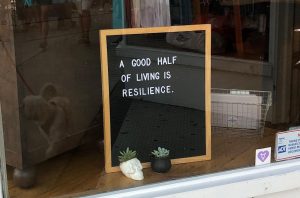
I am not a natural planner. In fact, I strive to be flexible in general in order to leave options open. Because I’m also an anxious person though, this can sometimes lead to a bit of a mental and emotional conflict. For the past several months, I have been working with a client who loves to plan. She thrives on knowing what she will do next and what to expect. As an anxiety sufferer herself though, she tends to question her decisions relentlessly. She will make a plan for child care, as an example, and then a couple days later be wracked with fear that it’s not the right choice. Second guessing herself takes away her power and makes her feel incapable of managing her life. Through some introspection on her part, and some encouragement on my part, we have found a way forward for her that has honestly been helpful for me in my personal life as well!
Those who suffer from anxiety know that typically, there are times when we are able to see things with clear eyes and a calm mind. Depending on how much anxiety you experience, these moments may only last for seconds to a few minutes, but they are usually there. What my client has found, is that in these moments of calm awareness, if she can look at a situation as a whole and make a plan during that time, all she has to do from that point on is follow it. Using the child care example, she decided a while back after thinking through all of her options and looking at the factors involved, that she would start her baby in full time daycare at 2 months old. She felt some guilt even while making the decision but had a deep sense of knowing that it was the right choice for her family.
As the days got closer to her daughter starting daycare, she felt very anxious and questioned her decision often. I could sense that her hesitation to follow through on the plan was based on what she feared she “should” be doing according to specific childrearing rhetoric she has been exposed to most of her life, and not actual worries about the impact on her family. She knew this was the best choice for all of them. It was at this time she said, “I need to just follow the plan”.
This simple sentence came with such a visible sense of relief, it was palpable. We talked through the factors that caused her to come up with this plan and how sure she felt about it at the time. We talked through the role of anxiety in her questioning it now. Then we made the decision that unless a new piece of information comes to light to warrant a different choice be considered, she will simply follow the plan and see it through. This has resulted in her learning to trust herself and her ability to make good decisions in her life. She is also realizing that sometimes, no matter how prepared she is and how much she plans, anxiety will just be there. Gently reminding herself that she is doing her best and will not allow her anxiety to make decisions for her has helped a great deal.

